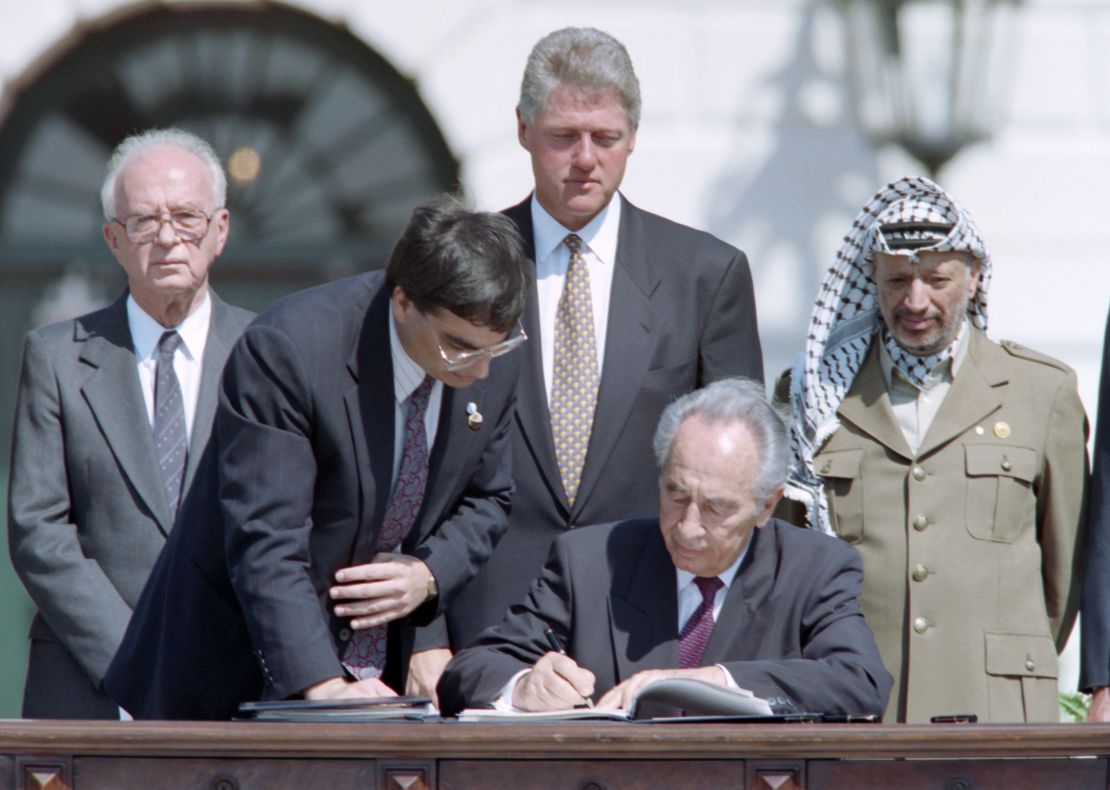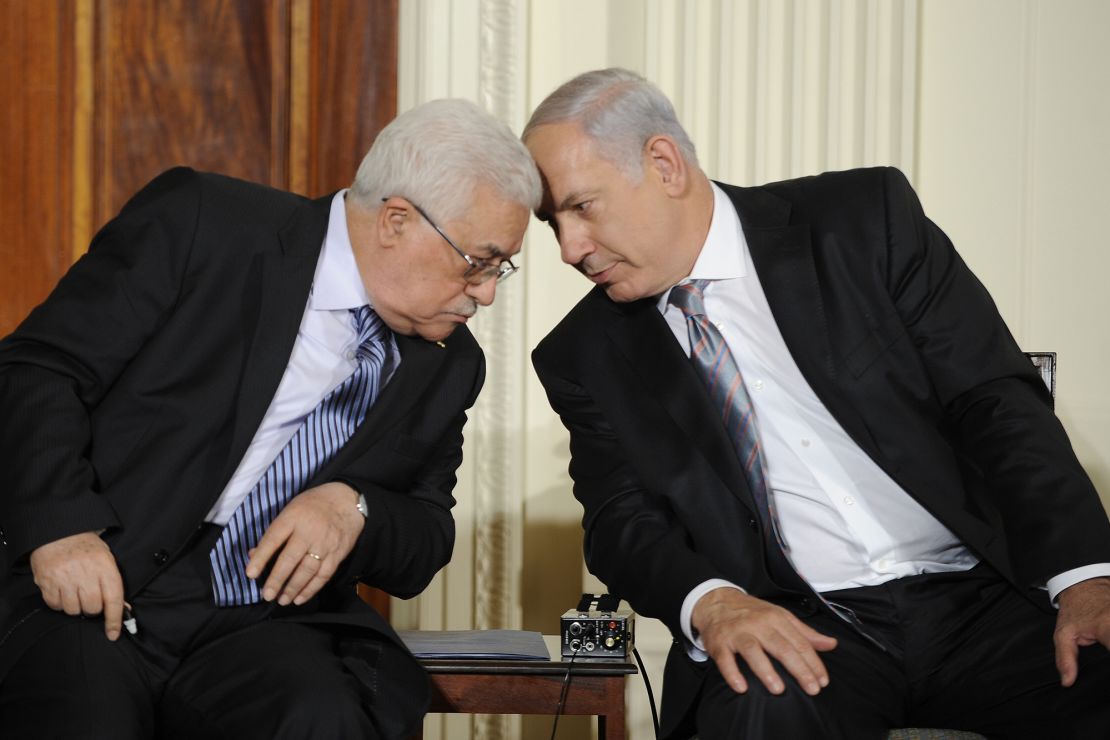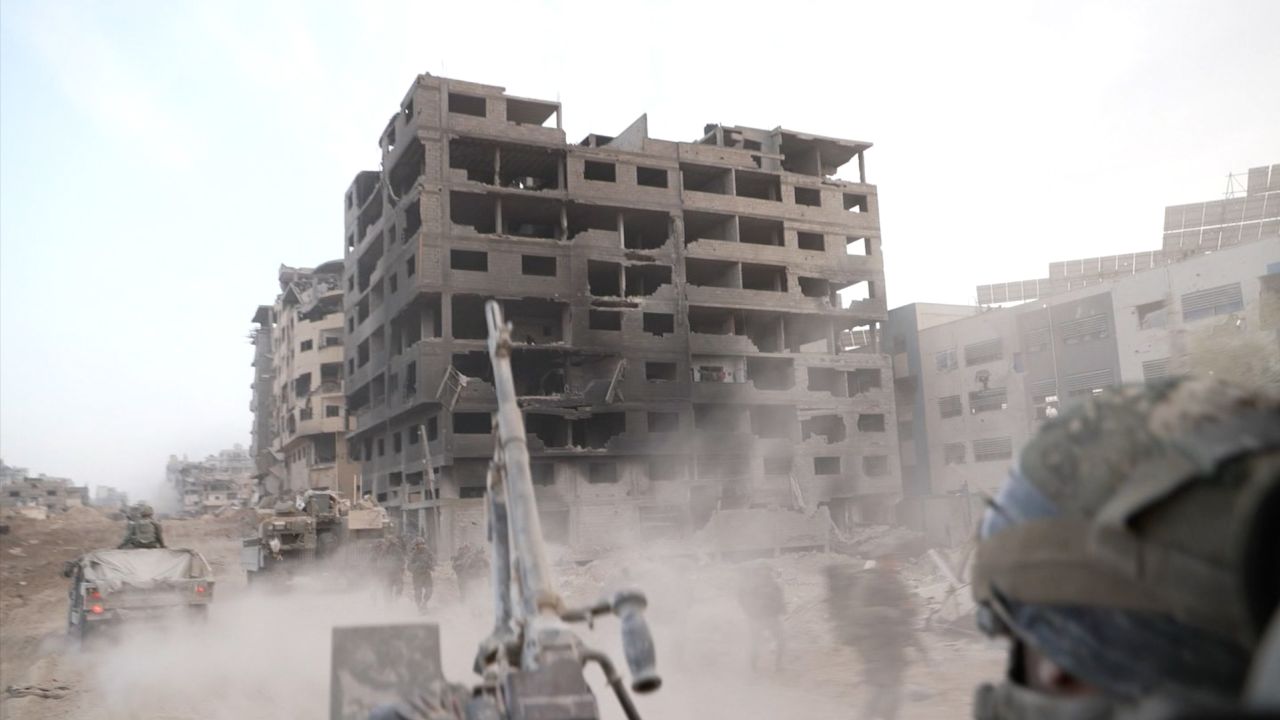Editor’s Note: Hussein Ibish is a Senior Resident Scholar at the Arab Gulf States Institute in Washington. His most recent book is “What’s Wrong with the One-State Agenda? Why Ending the Occupation and Peace with Israel is Still the Palestinian National Goal.” The views expressed in this commentary are his own. Read more CNN Opinion.
The most important factor in determining the political outcome of Israel’s current war will not take place in Gaza — but will instead unfold in the West Bank.

That’s because if Israel really wants to deliver a serious long-term blow to Hamas as a potent political movement among the Palestinian people, it’s going to be essential to seriously rethink its attitude towards the Islamist extremist group’s archrivals: the Fatah-dominated Palestinian Authority (PA) in the West Bank and Palestine Liberation Organization (PLO) on the international stage.
Without strengthening these Palestinian groups, which still represent the mainstream of the national movement, Hamas and even more extreme groups will almost certainly continue to grow and thrive among the Palestinian people.
If Israel is now serious about decimating Hamas’s military and political power, that cannot be done only or even mainly by killing the group’s leaders and members and blowing up its equipment and infrastructure. New people can and will fill the void and insurgencies can successfully operate on a shoestring and under extremely onerous conditions.
Because the Palestinian people, their cause and their national movement are not going to disappear, the only way to really marginalize Hamas in the long run is to abandon the policy of simultaneously strengthening and weakening both Palestinian factions to keep them at odds with each other and therefore ineffective as a national movement.
Hamas, the early years
In one of the most reckless and self-defeating policies in its young history, Israel, from the outset, sought to bolster and use Hamas to split and thereby cripple the Palestinian national movement.
Hamas was formed by the Muslim Brotherhood in Gaza during the firmament of the first Palestinian intifada (uprising) against Israeli occupation in 1987. Israeli occupation authorities immediately believed they had stumbled upon a marvelous opportunity to divide Palestinians between secular nationalists and Islamists just as they began to rise up on the ground in the occupied territories.
Hamas was given considerable leeway to organize and form itself, with Israel turning a blind eye to the organization’s early efforts to structure and found itself — activities that would have been ruthlessly suppressed if pursued by either Fatah-dominated organizations or the local grassroots committees that led the first uprising in its initial months.

For a brief period during the Oslo negotiations and the initial implementation of the Israeli-Palestinian agreements that led to the formation of the small self-administered Palestinian enclaves in the West Bank and most of Gaza in the 1990s, this deeply misguided strategy of divide and rule was essentially set aside in favor of serious negotiations with the PLO and a significant degree of cooperation with the PA.
However, after the failure of the Camp David summit in 2000 and the subsequent outbreak of the far more violent second intifada in the fall of that year, the Israeli right resumed power. Under Ariel Sharon and Benjamin Netanyahu, the Israeli right has dominated national politics for the vast majority of subsequent years, and it eagerly resumed a divide and rule approach.
This seemed to reach a successful crescendo in 2007, when a year of divided government among Palestinians — with a Fatah presidency under Mahmoud Abbas and a Hamas-dominated legislature — collapsed into open conflict and Hamas violently expelled Fatah and the PA from Gaza.
Israel’s ‘divide and rule’ approach
For Netanyahu and his colleagues, this split was ideal. Hamas’ unwavering commitment to armed struggle and violence allowed the Israeli right to paint the entire Palestinian national movement as hopelessly extreme.
And the split between Gaza and the West Bank provided Israelis who wanted no part in any additional negotiations with the Palestinians which could result in a two-state solution with a perfect excuse not to sit down with the PLO, by claiming that they do not represent the entirety of the Palestinian people.
For almost 20 years, Israel’s policy was to keep Hamas in power in Gaza, albeit besieged and contained, and periodically and literally cut down to size through wars cynically described as “mowing the grass,” while at the same time ensuring that the PA continued to control the self-administered enclaves in the West Bank, albeit with extreme institutional and political weakness.
Above all, the core goal appeared to be to ensure that the Palestinian division prevented any additional movement towards the creation of a Palestinian state or the development of any further restrictions on Israeli settlement activity and the now openly-declared national policy goal of eventual additional major annexation in the West Bank.
In March 2019, Netanyahu told a private meeting of Likud party Knesset members that “whoever is against a Palestinian state should be for” transferring funds to Hamas in Gaza, according to the Jerusalem Post. He reportedly said that this was part of Israel’s strategy — to isolate the Palestinians in Gaza from the Palestinians in the West Bank. This articulated policies that the Israeli right had been diligently following for many years. And it led, inexorably and predictably, to the October 7 massacres.
What Hamas did next
Israelis, including the national security establishment, were taken aback by the Hamas attack of October 7 because they had wrongly concluded that both Palestinian groups were content to rule their separate fiefdoms and persist in a relative stalemate for dominance of the national movement that played perfectly into Israel’s hands.
What the Israelis had not appreciated is that since Hamas’ founding in 1987, its prime directive has been to maneuver to take over the Palestinian national movement and, eventually, the PLO with its invaluable international diplomatic presence, including nonmember observer state status at the UN and over 100 embassies around the world.
It was instantly obvious after the October 7 killing spree that the increasingly unpopular Hamas was seeking to use violence assert its dominance of the national movement. Indeed, it’s clear that Hamas expected an overwhelming military response from Israel on the ground in Gaza, and that it hopes to provoke a long-term Israeli security presence against which it can, sooner rather than later, organize a sustained and increasingly powerful insurgency.
The obvious goal is to contrast this armed resistance, not just now, but especially in coming years, with PA security cooperation with Israel and the PLO’s unwavering commitment to securing independence through a two-state agreement with Israel.
The only rational choice left for Israel in the wake of October 7 is to finally choose to deal seriously and constructively with the Palestinians who are committed to talking to Israelis, as opposed to bolstering those who want to kill Israelis.
It may go against all the instincts of many Israeli extremists in the current government, including Netanyahu, but if they do not begin to deal seriously, constructively and cooperatively with the PA and the PLO, Hamas and even more extreme groups will continue to thrive.
This means taking any number of obvious measures to strengthen the PA institutionally and politically, including by expanding its authority in the West Bank.
And it means reengaging with the PLO at the negotiating table to seriously discuss a viable accommodation that meets the needs of both peoples.
Beyond Mahmoud Abbas
Many Israelis may find it hard to imagine suddenly taking Mahmoud Abbas, who is both the PA president and the PLO chairman, seriously, both because they are used to thinking of him as a spent force and ineffective leader, and because he has lashed out in frustration with language that has been highly offensive, including regarding the Holocaust.
There is no doubt that Abbas is, in almost every imaginable way, long past his sell-by date. But the old, infirm and chain-smoking politician, who at least has time and again proven his unwavering rejection of violence as a Palestinian national strategy, represents exactly this trend among Palestinians. And when he passes, sooner rather than later, from the scene, he will be replaced by others from the same tendency.

Israelis cannot approach this decisive strategic and political inflection point by focusing on the personality, failures or foibles of Abbas. In many ways, Israel’s consistently hostile policies were the single biggest factor in shaping him into the highly flawed figure he has become.
This is the Palestinian leader who, after all, resigned as Yasser Arafat’s Prime Minister during the second intifada and voluntarily went into an open-ended sojourn in the political wilderness, precisely because he categorically rejected the use of violence.
Moreover, it’s not about Abbas or his inner circle as personalities. It must be about strengthening the hands of Palestinians who sincerely seek an accommodation with Jewish Israelis and represent the primary obstacle to Hamas finally achieving political dominance among Palestinians.
It’s a no-brainer, but Netanyahu and his government show no signs of understanding the necessity of such a radical policy shift. The Biden administration appears to understand the challenge in theory, but how much they can or will do to implement such a revised policy towards the Palestinian political scene is uncertain at best.
Get Our Free Weekly Newsletter
- Sign up for CNN Opinion’s newsletter
- Join us on Twitter and Facebook
Given the profound governance, security and intelligence failures revealed by the October 7 attack — which was “successful” beyond Hamas’s wildest fantasies —Israelis should certainly be seeking new leadership. If and when they at last turn their backs on Netanyahu and the coterie of Jewish supremacists surrounding him, it’s essential that the next phase of Israeli strategic thinking reflects at least some understanding of the Palestinian political scene and what Israel’s real options are.
It’s not too late to choose to deal seriously, respectfully and constructively with Palestinians who are sincere about a negotiated agreement for peaceful coexistence. The alternative was on full display on October 7.
No amount of death and destruction in Gaza or elsewhere is going to provide Israel with lasting security. A negotiated agreement with the Palestinian factions who, despite everything, still want to reach a peace deal with Israel — for good or ill, currently led by Abbas — can bring that about. It’s the only thing that can bring Israelis peace and genuine security.





